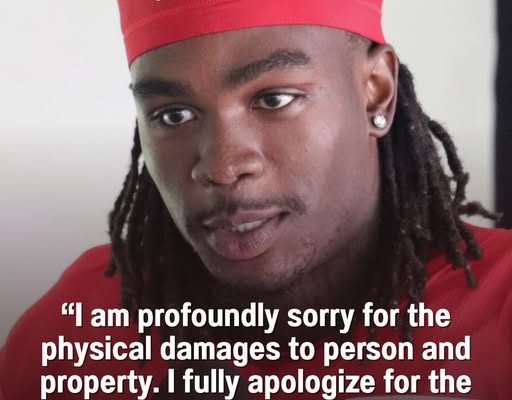Rashee Rice, the promising wide receiver for the Kansas City Chiefs, has recently found himself in the center of national attention—not for his accomplishments on the football field, but for his legal troubles off it. On Thursday, Rice was sentenced to five years of probation and 30 days in jail as part of a plea agreement tied to his involvement in a high-speed crash that occurred earlier this year in Dallas, Texas. Following the sentencing, Rice issued a public apology, acknowledging the severity of his actions and expressing remorse for the impact they had on others. This moment serves not only as a significant turning point in Rice’s young career but also as a sobering reminder of the responsibilities that come with fame, wealth, and influence.
The incident at the heart of this controversy occurred in March, when Rice was involved in a street racing incident that led to a six-car pile-up on a busy Dallas expressway. The crash resulted in multiple injuries and considerable property damage. What made the matter worse in the public eye was Rice’s initial decision to flee the scene rather than stay and render aid or await authorities. For fans and critics alike, this behavior cast a shadow over what had been a promising start to his NFL career.
Rice’s apology, while important, cannot undo the damage caused. It can, however, serve as a platform for accountability, personal growth, and perhaps even a lesson for other athletes and public figures who may someday find themselves at a similar crossroads. The public tends to have a short memory when it comes to athletes’ off-field behavior, but that doesn’t mean the consequences should be taken lightly—nor should the path to redemption be paved without genuine reflection and change.
Rashee Rice’s journey to this point is one that many aspiring athletes can relate to. A standout at SMU (Southern Methodist University), Rice entered the NFL as a second-round pick and quickly became a key component of the Kansas City Chiefs’ offense, helping to fill the void left by the departure of veteran receivers. Known for his speed, agility, and reliable hands, Rice quickly built a rapport with quarterback Patrick Mahomes, showcasing his potential to be a long-term weapon in Andy Reid’s complex offensive system.
But as with many young players thrust into the limelight, Rice’s rapid ascent may have come with challenges he was not entirely prepared to handle. The combination of newfound fame, wealth, and the pressure to perform at the highest level can be overwhelming, especially for players still in their early twenties. Add to that the off-season freedom from the rigid structure of the NFL calendar, and it becomes easy to see how poor decisions can be made—decisions that have real-world consequences.
Legal troubles in professional sports are unfortunately not a new phenomenon. Many talented athletes have seen their careers derailed or permanently tainted due to lapses in judgment. Whether it’s substance abuse, domestic violence, or reckless behavior like the incident Rice was involved in, these situations often stem from a combination of immaturity, lack of proper mentorship, and a cultural atmosphere that sometimes enables rather than corrects such behavior.
The NFL has programs in place designed to help players avoid these pitfalls. The league’s Rookie Symposium, for instance, is intended to educate incoming players on issues ranging from financial literacy to legal responsibility and personal conduct. Teams also provide access to mental health professionals, life coaches, and former players who serve as mentors. But despite these efforts, problems persist—largely because real change comes not from institutional oversight but from individual responsibility and the willingness to learn from mistakes.
In his apology, Rice stated, “I take full responsibility for my actions. I understand that I put lives at risk and caused harm to others. For that, I am truly sorry. I promise to use this experience to grow, to be a better man, and to ensure that something like this never happens again.” While some will dismiss these words as mere damage control, others may see them as the first step in a long process of personal development. The sincerity of such a statement can only be proven over time, through consistent behavior and a renewed commitment to the values that athletes are expected to embody both on and off the field.
The sentencing itself—five years of probation and 30 days in jail—is significant. Some may see it as a lenient outcome, considering the gravity of the incident, while others may argue that the justice system has given Rice a second chance that he must not squander. Probation, especially over a five-year span, is not without its own challenges. It imposes strict conditions, including regular check-ins, community service requirements, possible travel restrictions, and a heightened level of scrutiny that can make even minor missteps legally significant.
For someone in Rice’s position, balancing the demands of an NFL career with the obligations of probation will be no small feat. Every action he takes—whether public or private—will be watched closely, both by legal authorities and the court of public opinion. Any violation of his probation could result in more severe consequences, including potential jail time or a suspension from the NFL. This situation forces Rice to live with a heightened awareness of his behavior, something that ideally leads not only to personal reform but to a broader awareness of the weight that his actions carry as a public figure.
The Chiefs organization, for their part, has expressed disappointment in the incident but stopped short of condemning Rice entirely. Head coach Andy Reid, known for giving players second chances and focusing on their potential for redemption, will likely play a key role in Rice’s rehabilitation both as a person and a player. The support of teammates and the organization could be critical in helping Rice stay grounded and focused on what’s ahead. However, support must be balanced with accountability. The message must be clear: actions have consequences, and no player is above the law.
From a broader societal perspective, incidents like these force us to grapple with our expectations of athletes. We often idolize them, placing them on pedestals without fully appreciating the immense pressure they are under. While this doesn’t excuse illegal or reckless behavior, it does highlight the importance of support systems, education, and proactive mentorship—especially for young athletes who may not have had positive role models growing up. A player like Rice, who has the talent to be a star, must also be taught the emotional maturity and decision-making skills that are equally essential to success.
One of the more troubling aspects of the case was the decision to flee the scene of the crash. In moments of crisis, character is revealed. The instinct to run rather than stay and face the consequences reflects fear, immaturity, and possibly poor guidance. This action added an extra layer of public scorn and complicated the legal proceedings. For future athletes who might find themselves in similar situations, the message should be clear: accountability begins in the moment. Staying on the scene, cooperating with authorities, and accepting responsibility in real time is not only legally advisable but ethically necessary.
Rice now finds himself at a crossroads. His athletic abilities remain intact, and his role in the Chiefs’ offense is still secure—at least for now. But the lingering question is how he will use this experience to mature. Will he become another cautionary tale of wasted talent, or will he seize this moment as a catalyst for growth and transformation? His future in the NFL will depend not just on catches and touchdowns, but on trust—trust from fans, coaches, teammates, and the league itself.
The timing of the incident and sentencing could not be more crucial. As the NFL prepares for training camps and the regular season looms, distractions like this are unwelcome for any team with championship aspirations. The Chiefs, with Patrick Mahomes leading the charge and Super Bowl expectations every year, must decide how to handle this situation internally. Do they issue a suspension? Do they place Rice in counseling or behavioral rehabilitation programs? Do they make an example out of him to deter others from similar mistakes? These decisions carry weight, not just for the team but for the league’s reputation.
NFL Commissioner Roger Goodell has often spoken about maintaining the integrity of the shield. That principle will be tested here. Will the league take disciplinary action under its personal conduct policy? And if so, will it be seen as just and fair by the broader public? These are questions that go beyond one player and speak to the culture of accountability within professional sports.
In examining Rice’s case, it’s essential to also consider the victims of the crash. Their lives were impacted physically, emotionally, and financially. While Rice has apologized, real atonement requires more than words—it requires action. Financial restitution, community service, and perhaps even using his platform to speak against reckless driving or promote public safety could be ways for Rice to begin making amends. Rehabilitation must be outward-facing as much as it is inward.
For young fans watching all this unfold, the narrative is mixed. On one hand, it shows that even talented stars can make serious mistakes. On the other, it offers a potential example of redemption, if Rice follows through. In an age where social media amplifies every misstep, and cancel culture looms around every corner, the path to redemption has become narrower—but not impossible.
Rashee Rice has an opportunity now to rewrite his story. What began as a reckless mistake that endangered lives can become a lesson in personal growth, accountability, and second chances. But that transformation won’t happen overnight, and it won’t happen without real effort. He must demonstrate that he has learned from this experience and is committed to doing better—not just saying it, but showing it every day, on and off the field.
His story is not yet finished. The next chapters will depend on how he carries himself moving forward. For fans, teammates, and the broader community, the hope is that this moment serves not as an end, but as a beginning. A beginning of a more mature, grounded, and socially responsible Rashee Rice. Because talent may win games, but character defines legacy.



